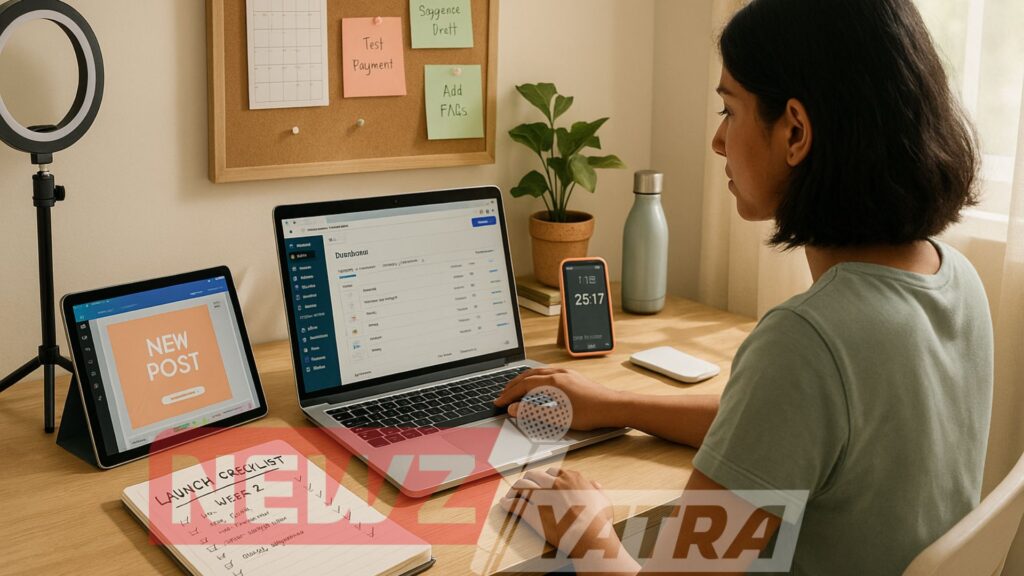Step-by-Step Guide to Launching Your First Online Business

Starting your first online business can feel overwhelming—especially when you don’t know where to begin. Maybe you’ve got a great idea but aren’t sure how to turn it into something real. Or you’re tired of your 9–5 and want more freedom, flexibility, and control over your income.
The good news? You don’t need a fancy degree, big budget, or tech background to get started. All you need is a clear plan, the right mindset, and a willingness to take the first step. (How to start an online business)
In this blog, I’ll walk you through every step of launching your first online business—from choosing your idea to setting up your website and making your first sale. Whether you want to start a side hustle or go full-time, this guide will give you the roadmap to move from “just thinking about it” to actually building it.
Let’s get started.
Online Business for Beginners: Launch Your First Business in 9 Easy Steps (How to start an online business)
Step 1: Choose the Right Business Idea (How to start an online business)
Why This Matters
Your business idea is the foundation of everything. It determines what you’ll offer, who you’ll serve, how you’ll market, and your income potential. Without a clear and viable idea, it’s easy to get stuck before you even begin.
So how do you come up with a profitable one? Start by brainstorming based on your own skills, hobbies, or areas of knowledge. Ask yourself: What do people often ask me for help with? What problems can I solve? Then, look outward—scan trends in industries like AI, sustainability, or remote work. These are growing markets full of opportunity.
Some popular online business models to consider include eCommerce (like dropshipping or selling your own branded products), digital products (such as courses, eBooks, or templates), freelancing or consulting in your area of expertise, affiliate marketing (earning commission by promoting other people’s products), subscription-based services, or even software tools (SaaS). The best idea is one that not only fits the market—but also fits you.
Step 2: Validate Your Idea (How to start an online business)
How This Helps
Before you build a website or invest time and money, make sure people actually want what you’re offering. Validation helps you avoid one of the most common startup mistakes—creating a product or service no one needs. It’s the difference between guessing and growing with confidence.
To validate your idea, start with tools like Google Trends and keyword research to understand demand. Study your competitors—if they’re making sales, that’s a good sign. Go further by running surveys or polls to gather honest opinions. You can even test the waters with a waitlist, pre-orders, or a simple MVP (minimum viable product) to see if real people are willing to pay.
The biggest mistakes to avoid? Falling in love with your idea without confirming market interest, ignoring feedback, or overbuilding before testing. Validation isn’t about perfection—it’s about smart proof before full commitment.
Step 3: Define Your Target Audience (How to start an online business)
Why This Is Key to Success
If you’re trying to speak to everyone, you’ll connect with no one. Truly understanding who you’re serving is what makes your products, messaging, and marketing click. Knowing your audience allows you to tailor your offers to their specific needs and build real trust.
To define your target audience, start by creating a detailed customer avatar. Ask yourself: What’s their age, gender, and location? What are their key interests, challenges, and pain points? How do they typically shop online, and what platforms do they spend time on? The clearer this profile is, the more effective your outreach will be. (How to start an online business)
Use tools like Facebook Audience Insights to analyze demographics, AnswerThePublic for common questions people are asking, and Reddit or niche forums to see real conversations happening in your space. The better you know your audience, the easier it becomes to sell to them.
Step 4: Build Your Online Presence (How to start an online business)
Your Website = Your Digital Storefront
Your website is often the first impression people will have of your business—it’s where trust begins. A clean, professional, and easy-to-navigate site boosts credibility and helps convert curious visitors into paying customers.
To get started, you’ll need a domain name and web hosting. Then choose a CMS (Content Management System) like WordPress, Shopify, or Webflow, depending on your business model. Website builders like Elementor, Framer, or Squarespace make it easy to design beautiful pages—even without coding skills.
At a minimum, be sure to include the following pages: a compelling Homepage, an About Us section to share your story, a Products/Services page, Contact info, an FAQ to handle common questions, and a Blog if you plan to drive organic traffic through content. (How to start an online business)
And don’t forget: your site must be mobile-responsive. With over 60% of traffic coming from mobile devices, a frustrating mobile experience could cost you leads and sales. A user-friendly site across all devices builds trust—and keeps people coming back.
Step 5: Set Up Payments & Logistics (How to start an online business)
Why It Matters
A seamless, secure payment experience builds trust and reduces abandoned carts—directly impacting your sales. If the checkout process is confusing or limited, you risk losing customers at the final step.
For digital or service-based businesses, set up a reliable payment gateway. Popular options include Stripe, PayPal, or Razorpay (great for India-based businesses). If you’re selling digital products, platforms like Gumroad, Sellfy, or Podia offer built-in payment and delivery solutions—ideal for eBooks, courses, or memberships. (How to start an online business)
For physical product businesses, logistics matter. You’ll need to plan for inventory management, packaging, and shipping. Platforms like Shopify or Etsy make it easier with integrated tools and shipping solutions, helping you manage operations without needing advanced tech skills.
Step 6: Create a Pre-Launch Strategy (How to start an online business)
Why Pre-Launches Generate Buzz
A strong pre-launch strategy can make all the difference. It builds anticipation, grows your email list, and gives your business momentum from day one. Instead of launching to crickets, you’ll have a warm audience ready and waiting.
Pre-Launch Checklist:
Start by creating a simple landing page that offers a compelling lead magnet—something valuable in exchange for an email (like a checklist, early access, or discount). Use social media to tease your offer, share behind-the-scenes content, and start telling your brand story. Collect emails through a waitlist or early bird signup, and add urgency with countdowns, giveaways, or sneak peeks. This builds hype—and trust—before you even go live.
Step 7: Launch Your Marketing Strategy (How to start an online business)
Why You Need a Plan
You could have the best product in the world, but if no one knows about it, it won’t sell. Marketing is how you get eyes on your business—and convert interest into income.
Low-Budget Marketing Tactics
You don’t need a massive ad budget to start. Focus on SEO-optimized blog posts to attract long-term search traffic. Use short-form videos like Reels, Shorts, or TikToks to grab attention and share value quickly. Build an email list with lead magnets, and nurture it with helpful tips or updates. Platforms like Pinterest can drive consistent, evergreen traffic. Don’t underestimate the power of collaborations—partner with others in your niche for shoutouts or giveaways.
Content Ideas to Attract Leads
Share “how-to” guides, customer stories, or behind-the-scenes moments from your journey. Talk about industry trends and share insights that position you as an expert. Authentic content builds trust—and trust leads to conversions.
Step 8: Use Analytics to Improve (How to start an online business)
Why Data Helps You Grow Faster
Success isn’t just about effort—it’s about direction. Tracking data helps you understand what’s working, what’s not, and where to focus next. Instead of guessing, you’ll be making smarter decisions backed by real insights.
Tools to Track Results
Use Google Analytics to monitor your website traffic and see where visitors come from and what they do on your site. Tools like Hotjar or Microsoft Clarity provide visual heatmaps and session recordings to show how users interact with your pages. For social and paid campaigns, Meta Ads Manager gives you in-depth performance reports. If you’re building an email list, platforms like Mailchimp or ConvertKit help track open rates, click-throughs, and conversions—so you can tweak and improve with every send.
Step 9: Automate & Scale (How to start an online business)
Why Automation Saves Time
Once your business is up and running, scaling sustainably means working smarter—not harder. Automation helps you streamline repetitive tasks, so you can focus on growth, strategy, and creativity without burning out.
What to Automate
Start by automating your welcome email sequences to nurture new subscribers. Use tools to automatically deliver lead magnets, schedule appointments, post content on social media, and send checkout follow-ups to recover abandoned carts. These small automations can lead to big wins over time.
Tools to Explore
Platforms like Zapier help connect your apps and automate workflows. Mailchimp or ConvertKit handle email automation, while Buffer and Hootsuite are great for scheduling social content. If you book client calls or consultations, Calendly makes scheduling seamless.

What to Do When You Feel Overwhelmed (How to start an online business)
Starting your first online business can feel exciting—but also seriously overwhelming. With endless to-dos, tutorials, and strategies out there, it’s easy to freeze or burn out before you really gain traction. That’s totally normal. The key isn’t to do everything—it’s to stay focused, grounded, and consistent.
Here’s how to stay on track when the overwhelm creeps in:
1. Break Your Goals into Weekly Chunks (How to start an online business)
Instead of staring at a massive 6-month goal like “launch my business,” zoom in. Break it down into bite-sized, weekly action steps.
For example:
- Week 1: Finalize your business idea and validate it
- Week 2: Set up your domain and basic website
- Week 3: Write your homepage and about page copy
- Week 4: Set up payment and product delivery
Why it works: Small wins each week build confidence and momentum. You stay focused and stop chasing shiny objects.
2. Follow a 90-Day Plan (How to start an online business)
Trying to plan a full year in advance is overwhelming—and often pointless, because things change. Instead, use a 90-day sprint system.
Each quarter, choose:
- 1 main goal (e.g., launch website, create digital product, hit $1k revenue)
- 3-5 sub-tasks per month that lead toward that goal
This timeframe is long enough to make serious progress but short enough to stay motivated.
Why it works: You stay intentional. You know exactly what matters and what doesn’t (at least for now).
3. Focus on 1–2 Channels, Not Everything (How to start an online business)
You don’t need to be everywhere. At the start, master one or two platforms where your audience hangs out instead of spreading yourself thin.
For example:
- Are you targeting Gen Z or creatives? Start with TikTok or Instagram Reels.
- Want evergreen traffic? Start with Pinterest and blog posts.
- Selling B2B or services? Try LinkedIn + email marketing.
Why it works: You build traction faster and avoid burnout from trying to juggle every social platform or marketing method.
4. Remind Yourself: “Done is Better Than Perfect” (How to start an online business)
Perfectionism kills momentum. That perfect homepage, the flawless email funnel, or “just one more tweak” can delay your launch for weeks.
Shift your mindset to:
- Launch the MVP (minimum viable product)
- Learn from real feedback
- Improve iteratively
Remember: You can’t optimize something that doesn’t exist. (How to start an online business)
Why it works: Real progress beats endless planning. Taking imperfect action builds confidence and gets you results.
Your Dream Business Won’t Build Itself—But You Can (How to start an online business)
You don’t need to be a tech wizard, a marketing guru, or a millionaire to start your first online business. What you do need is courage, clarity, and consistency. (How to start an online business)
Building something from scratch isn’t easy—but neither is staying stuck in a job or lifestyle that doesn’t fulfill you. Each small step you take—from picking your idea to hitting “publish”—moves you closer to freedom, flexibility, and the kind of life you actually want. (How to start an online business)
So take that first step. Then take the next. Launch messy. Learn fast. Iterate often.
Because done is better than perfect.
And starting is better than staying stuck.
And that business you keep thinking about?
It’s waiting for you to begin. (How to start an online business)
How to Save $10,000 in 6 Months Without a High Salary!
Frequently Asked Questions (FAQs)
1. Do I need technical skills to start an online business? (How to start an online business)
No, you don’t! Many website builders like Shopify, WordPress (with Elementor), and Squarespace are beginner-friendly and require zero coding experience. Most platforms also offer drag-and-drop functionality to make setup easy.
2. How much money do I need to start?
You can start with a very small budget. At a minimum, you’ll need funds for a domain name ($10/year) and web hosting ($3–$10/month). Many tools offer free plans to get started, especially for blogging, email marketing, and social media.
3. What’s the best online business model for beginners?
That depends on your skills and goals. Popular beginner-friendly models include:
- Freelancing or consulting
- Selling digital products (like eBooks or templates)
- Affiliate marketing
- Dropshipping (low inventory eCommerce)
4. How long does it take to start seeing income?
It varies. Some people earn in their first month; others take a few months to gain traction. The key is consistent action, smart marketing, and solving a real problem for your audience.
5. Can I run an online business while working a full-time job?
Absolutely. Many successful entrepreneurs start as side hustlers. Set aside dedicated time weekly, automate where possible, and focus on high-impact tasks first.
6. How do I drive traffic to my new website?
Start with:
- SEO blog posts targeting beginner keywords
- Social media (Instagram, TikTok, Pinterest, etc.)
- Email marketing with lead magnets
- Collaborations or shoutouts
- Short-form video (Reels, Shorts)
7. What if I pick the wrong idea or niche?
It’s okay to pivot. That’s part of the learning process. The most important thing is to start, gather feedback, and adjust based on what the market wants.






